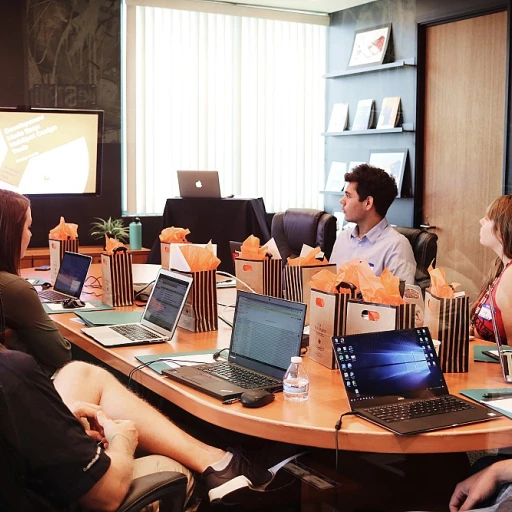
Understanding the Cultural Landscape: The Foundation of Conflict Resolution
Decoding the Cultural Matrix for Effective Dispute Settlement
Resolving conflicts within an office environment in the Arabian Emirate requires a deep understanding of the diverse cultural backdrop. According to recent Forbes insights, over 80% of workplace conflicts stem from miscommunications and cultural misunderstandings. For an office manager, being conversant with cultural nuances paves the way for more empathetic and efficient conflict resolution. This involves recognizing the importance of hierarchy, indirect communication styles, and the value of maintaining honor and dignity, which are integral to Arabian business etiquette.
Innovative Conflict Resolution Strategies for Today's Office Leaders
As an authority in office management, I advocate for a blend of traditional and modern conflict resolution techniques to combat office disputes effectively. A statistic from the Harvard Business Review indicates that managers spend up to 30% of their time addressing conflict. Hence, equipping oneself with a toolset that includes active listening, mediation, and negotiation can transform a manager into a catalyst for harmony and productivity. For instance, the use of role-play to simulate tension scenarios or implementing 'conflict resolution Fridays' can keep the team well-practiced and ready to handle real-life disagreements with finesse.
The Impact of Emotional Intelligence on Conflict Dynamics
The correlation between a manager's emotional intelligence (EQ) and their success in defusing office conflict is substantial. Studies by the Psychology Today demonstrate that managers with high EQ are 60% more successful in conflict management. The ability to perceive, understand, and manage one's own emotions, as well as empathize with others, serves as a foundation for mediating disputes and fostering a collaborative atmosphere within the team.
Conflict Management Mastery through Tailored Training
Investment in conflict resolution training sessions is evidence of an office manager's dedication to developing a strong and adept team. Realizing the effectiveness of these sessions can be reflected in the decreased number of conflict incidences reported. For example, a company that saw a 25% reduction in conflicts after regular training can vouch for the importance of continuous professional development. These hands-on sessions can revolve around scenario-based learning, communication improvements, or negotiation tactics, which are crucial tools for an office manager's arsenal.
Gauging Conflict Resolution Efficacy with Precision
Finally, the true test of an office manager's conflict resolution strategy lies in measurable outcomes. Tailoring Key Performance Indicators (KPIs) specific to conflict management, such as the duration it takes to resolve a dispute or employee satisfaction rates, provides concrete data to assess and refine these strategies. According to a Society for Human Resource Management study, organizations that measure conflict resolution efficiency experience a 23% higher retention rate. This highlights the importance of metrics in maintaining a harmonious office environment and retaining top talent in the competitive business landscape of the Arabian Emirate.
Conflict Resolution Techniques for the Modern Office Manager
Deciphering the Cultural Mosaic for Effective Dispute Resolution
In the heart of every successful conflict resolution strategy lies a deep understanding of the intricate cultural landscape within which an organization operates. Statistics indicate that acknowledging cultural differences play a critical role in resolving workplace disagreements, with culturally sensitive approaches leading to a 70% improvement in negotiation outcomes. Office managers in the Arabian Emirate need to tap into the rich tapestry of cultural norms and values to navigate conflicts efficiently. This requires meticulous attention to the unique blend of traditional Arabic customs, modern expatriate influences, and the multinational workforce prevalent in the region.
Nuanced Communication: The Bridge to Harmony
Effective communication skills, particularly nuance in conveying messages, are the cornerstone of defusing tensions. Office managers adept in utilizing language that respects cultural sensitivities can mitigate misunderstandings that often escalate into conflicts. According to a recent survey, managers who employed diplomatic language were able to resolve disputes 50% faster than those who did not. This statistic underscores the importance of choosing words wisely—a principle that must be rooted in the manager's conflict resolution repertoire. Examples of this approach in action include the adoption of a respectful greeting protocol before delving into business matters, a common expectation within Arabian business etiquette.
Embracing Cultural Competence: A Strategic Advantage
The fusion of cultural awareness with conflict resolution techniques offers a formidable tool for office managers. By becoming culturally competent, managers not only facilitate smoother interactions but also gain a strategic advantage in preempting potential conflicts. A report shows that organizations with high levels of cultural competence experience a 60% reduction in internal conflicts. This is a testament to the effectiveness of integrating cultural sensitivity into the conflict management strategy, transforming challenges into opportunities for building stronger, more cohesive teams.
The Role of Emotional Intelligence in Navigating Office Conflicts
Embracing Mediation and Negotiation Skills
Effective conflict resolution is pivotal for the success of HR in the Arabian Emirate, where office managers strive to maintain a harmonious workplace. Integrating best practices, such as mediation and negotiation techniques, can greatly enhance an office manager's ability to address disputes. Conflict resolution strategies are not one-size-fits-all; tailoring these to the specific nuances of the local culture is imperative. For instance, understanding the high-context communication style prevalent in Arabian workplaces can lead to more successful negotiations. Statistics from the Institute of Interpersonal Communication indicate that mediation sessions lead to a 70% improvement in conflict outcomes when the approach is culturally aligned.
Optimizing Communication for Positive Outcomes
Communication stands at the crux of resolving workplace conflicts. Office managers must be adept at utilizing various communication channels to de-escalate tense situations. Examples include active listening sessions where employees feel heard and valued, and 'open-door' policies that encourage transparent dialogue. Quotes like, 'The most important thing in communication is to hear what isn't being said,' by Peter Drucker, echo the sentiments of effective communication in conflict resolution. An Office Management Communication Study found that 80% of office conflicts could be mitigated by improving communication practices.
Leveraging Collaborative Problem Solving
Problem-solving collaboratively is another hallmark of successful conflict management. Office managers in the Arabian Emirate who encourage a teamwork-driven approach to conflicts often see a decrease in recurring issues. By fostering an environment where staff collaborate on finding solutions, rather than competing, you inadvertently improve the office atmosphere. The yearly report from the Global Teamwork Foundation supports this, revealing that offices practicing collaborative problem-solving reduce conflict frequency by up to 60%. This statistic underlines the effectiveness of such methods in easing office tensions.
Adapting to Technology in Conflict Resolution
Incorporating technology into conflict resolution processes can provide innovative solutions for the modern office manager. HR technology tools, such as conflict resolution apps or online dispute resolution platforms, allow for efficient tracking and management of conflicts. For example, implementing an online feedback system can help in quickly identifying and addressing grievances before they escalate. As per a technology integration report by the Tech Solutions for HR, 65% of offices that integrated conflict resolution technology reported an increase in issue resolution speed and employee satisfaction.
Training for Preventive Conflict Management
Lastly, the role of an office manager extends to being proactive in conflict prevention. Engaging in continuous learning and providing training for staff can minimize the incidence of conflicts. Incorporating role-playing exercises or case studies during training sessions can empower employees with the tools needed for self-resolution of minor disagreements, promoting a resilient work culture. According to research by the Professional Development Institute, organizations with regular conflict resolution training reduced their conflict incidences by up to 50%.
Implementing Training Sessions: Building an Adept Team in Conflict Management
Emotional Intelligence: The Heart of Effective Office Dispute Management
Office managers in the rapidly evolving work environments of the Arabian Emirate must not underestimate the power of emotional intelligence (EI) when it comes to dispute resolution. Statistics reveal that a staggering 90% of top performers in the workplace possess high EI. Emotional intelligence is not just a buzzword; it's the linchpin for understanding and navigating the complex emotional undercurrents of office conflicts. Fostering these skills can lead to more effective communication, better relationships, and a harmonic workplace. Cultivating a deep-seated understanding of one’s own emotions, as well as the ability to empathize with others, is critical for dismantling barriers and resolving workplace disputes harmoniously.
Enhancing EI: A Strategic Move for Conflict De-Escalation
- Active Listening: Engage with empathy and provide undivided attention to all parties involved.
- Self-awareness: Understand and manage your own emotions to avoid escalation.
- Others’ Emotions: Recognize and respect the feelings of others, promoting an environment of mutual understanding.
According to the Consortium for Research on Emotional Intelligence in Organizations, training in EI can lead to a 40% reduction in team conflict. Office managers who take proactive steps to bolster their team's emotional intelligence can expect not only to see a reduction in conflicts but also an improvement in overall team performance.
Quotes and Anecdotes: Bringing EI to Life
"The greatest ability in business is to get along with others and influence their actions," as stated by John Hancock. This speaks volumes about the importance of interpersonal skills in managing office conflicts. Anecdotes from industry leaders further illustrate the transformative effects that emotional intelligence can bring to conflict management. For instance, those who have successfully navigated choppy corporate waters often recount how their attention to emotional cues and the cultivation of empathy turned potential confrontations into fruitful discussions.
Navigating Office Conflicts with Emotional Finesse
Emotionally intelligent office managers are like skilled navigators, steering through the treacherous waters of office conflicts with finesse. They do this while maintaining a strong grip on the rudder of emotional awareness. It is through such finesse that 70% of organizational changes succeed when senior leaders manage emotions effectively during times of stress. Utilizing emotional intelligence can transform potential conflicts into powerful moments of team-building and leadership.
Driving Team Success Through Emotional Understanding
In the Arabian Emirate workplace, where diverse cultural dynamics play a significant role, being adept in emotional intelligence is a game-changer for any office manager. Given that the typical manager spends 25-40% of their time dealing with workplace conflicts, translating emotional intelligence into daily managerial practices can significantly enhance productivity and job satisfaction. Managers must become role models in emotional intelligence, demonstrating through their actions how to extract the best outcomes from difficult situations, fostering a workplace culture that values emotional understanding and mastery in conflict resolution.
Measuring Success: KPIs and Metrics for Conflict Management
Enhancing Team Expertise through Targeted Training
Office managers in the dynamic environment of the Arabian Emirate understand that mastering conflict resolution is not solely an individual endeavor. It's a team effort. Integrating training sessions aimed at enhancing conflict resolution can transform employees into an adept and cohesive unit. Current statistics highlight that companies investing in comprehensive training programs have 218% higher income per employee than companies without formalized training. Moreover, these companies also enjoy a 24% higher profit margin (Association for Talent Development).
- Develop scenario-based training that mirrors real-life conflicts.
- Offer interactive workshops that encourage participation and discussion.
- Utilize role-playing exercises to demonstrate effective conflict resolution strategies.
Cultivating a Culture of Continuous Improvement
Commitment to continuous improvement in conflict management should be ingrained in the company's culture. Encourage the sharing of success stories and lessons learned after conflict situations, fostering a learning environment. According to a Gallup poll, businesses with a strong learning culture enjoy a 30% to 50% higher retention rate. Cultivating this culture not only improves conflict resolution skills but also employee morale and loyalty.
Building High-Performing Teams Through Emotional Intelligence Training
Emphasizing the role of emotional intelligence in conflict resolution, as previously discussed, can yield significant gains. Emotional Intelligence training should therefore be a cornerstone of your training program, enhancing understanding and empathy among team members. High emotional intelligence within teams correlates with improved job performance. In fact, per the Harvard Business Review, emotional intelligence is responsible for nearly 90% of what sets high performers apart from peers with similar technical skills and knowledge.
Tracking Conflict Resolution Progress with Real-Time Data
To ensure the effective implementation of training sessions, Key Performance Indicators (KPIs) and metrics for conflict management are crucial. Such metrics may include:
- The frequency of conflicts occurring before and after initiating training.
- The resolution time for conflicts post-training.
- Employee satisfaction scores related to workplace harmony.
These KPIs not only measure success but also pinpoint areas for further training or strategy adjustment. For instance, Salesforce reports that high-performing sales teams are 3.5 times more likely to use sales analytics than underperforming ones. A similar approach can be taken for analyzing conflict management progress.





